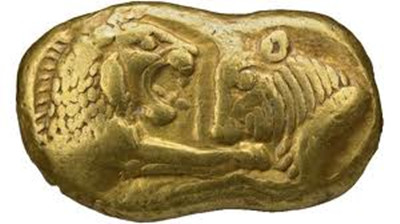"Get Rich Quick!" trumpets the promo on a buzzy financial website.
“像克羅伊斯一樣富有”是一句流傳千年的俗語。
Start with fifty bucks, it says, and very soon, you'll become "rich like Croesus".
直到今天那些宣稱50美元就能讓你快速發家的投資廣告上還會不時出現。
It's a promise that's been made countless times through the centuries, despite financial booms and busts, but what intrigues me most about finding it on this hyper-modern website is that the name of Croesus still stands for the ultimate in wealth.
這樣的承諾已經在幾個世紀間流傳,雖然金融繁榮和蕭條并存,但最令我好奇的是什么這位大富豪的名字仍然代表著最終極的財富。
After so many centuries, Croesus is still the world-wide symbol of the man who's made it.
數個世紀過后,克羅伊斯王仍然是世界級的代言人。
The real King Croesus was indeed fabulously rich and, until a horrible twist at the end of his life, he did have a wonderful time with his money.
他確實非常富有,而且據我們所知,在晚年生活出現轉折之前,財富一直讓他十分快樂。
We don't know who first coined the phrase "as rich as Croesus", but it's now embedded not just in our language but in many others, and we're going to be looking at some of the world's first proper coins in this programme.
我們不知道是誰是第一個在金幣上印有“像克羅伊斯一樣富有”一詞的人,但現在這種習慣不僅深入到我們的語言當中,而且在諸多方面也是如此。本期節目我們就會一睹世界首枚金幣的真容。
"I imagined it was flatter and more circular, but this is convex, with a design only on one side."
“我想象的它更平面,更圓,但現在凸,設計只出現在一邊。”
"The stamps on them are the guarantee of the weight and the purity."
“上面的印章是重量和純潔的保證。”












